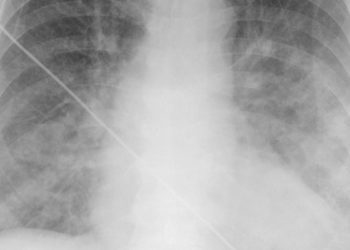Anthracycline may be associated with increased incidence of heart failure
1. For patients with a history of lymphoma or breast cancer, anthracycline use is associated with a higher incidence of congestive heart failure (CHF) at 25 years follow-up.
2. Chemotherapy without anthracycline in patients with lymphoma or breast cancer was not associated with higher CHF incidence.
3. Patients receiving a dose of greater than 180 mg/m2 of anthracycline were associated with higher CHF incidence, but not with a dose of less than 180 mg/m2.
Evidence Rating Level: 3 (Average)
Anthracyclines are chemotherapy agents used in lymphoma or breast cancer that have known dose-dependent associations with cardiotoxicity, and in particular, congestive heart failure (CHF). However, the risk factors that mediate this association and the long-term incidence are not well-known. Therefore, this population-based case-control study aimed to compare the incidence of CHF in patients with lymphoma or breast cancer history who did and did not undergo anthracycline therapy, matched by age, sex, and other comorbidities (such as hypertension, coronary artery disease, and obesity) to a control cohort. The study population consisted of patients treated with chemotherapy for lymphoma or breast cancer between 1985 and 2010, matched to control patients in a 1:1.5 ratio. In total, there were 2196 participants, 812 with a cancer history treated with chemotherapy, and 1384 in the control group. The study found that those with a cancer history had a higher risk of developing CHF compared to the control (hazards ratio 3.25, 95% CI 2.11-5.00, p < 0.001). This association remained significant when examining participants with history of anthracycline use (HR 2.56, 95% CI 1.02-6.41, p = 0.04). However, the association was not significant for cancer patients who did not have anthracycline therapy (HR 1.78, 95% CI 0.83-3.81, p = 0.14). In addition, the incidence of CHF amongst those treated with anthracycline was greater than the control group at 1, 5, 10, 15, 20, and 25 years (p < 0.001 for all), while there was no difference in CHF incidence between cancer patients not treated with anthracycline compared to control. There was also a dose-dependent association, with no significant difference in CHF incidence for patients who received less than 180 mg/m2 of anthracycline, but a higher risk for those receiving 180-250 mg/m2 (HR 0.54, 95% CI 0.19-1.51) and greater than 250 mg/m2 (HR 1.23, 95% CI 0.52-2.91). Furthermore, apart from age, no other comorbidities or risk factors were associated with CHF, and there were no differences in CHF incidence for lymphoma versus breast cancer patients. Overall, this study demonstrated that for patients with lymphoma or breast cancer history, anthracycline therapy in doses greater than 180 mg/m2 is associated with a higher incidence of CHF compared to control, whereas chemotherapy without anthracycline is not associated with a higher CHF incidence.
Click to read the study in JAMA Network Open
Image: PD
©2023 2 Minute Medicine, Inc. All rights reserved. No works may be reproduced without expressed written consent from 2 Minute Medicine, Inc. Inquire about licensing here. No article should be construed as medical advice and is not intended as such by the authors or by 2 Minute Medicine, Inc.







